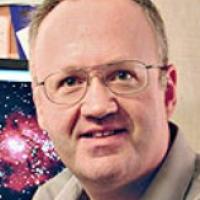
Senior Research Scientist, Artificial Intelligence Center (Retired)
Adjunct Professor of Computer Science
Dr. Covington’s Spiritual Journey – When I was nine years old, I was surprised to learn that according to the Bible, we only get to spend eternity with God if we make a personal commitment to Christ and ask Him to forgive our sins. Until then, I had had the vague idea that all it took was “being good” and going to church regularly. Not so.
I thought eternity was important, so I made the commitment to Christ first privately in prayer, and later publicly by joining the church and being baptized.
But I knew I wanted to be a scientist, and I was worried. People kept telling me science wasn’t compatible with Christian beliefs. As a temporary measure, I kept science and Christ in separate compartments in my mind.
I was fairly sure that as I grew older, the day would come when I would have to either accept ” faith” a lot of things that appeared to be false, or else abandon biblical Christianity, replacing it with something watered down.
That day never came. In fact, it’s quite the opposite. Christian faith helps me understand the world scientifically. As C. S. Lewis put it, “I believe in Christianity as I believe the sun has risen: not only because I see it, but because by it I see everything else.”
An essential part of the Christian worldview is that our minds are worth something, and that we have the right and the ability to do scientific research. Without those assumptions I could not be a scientist.
Contrast that with a “donít mess with Mother Nature” kind of religion ñ in which science is forbidden because you might upset the spirits of the rocks and the trees. Contrast it also with a “spiritual is good, physical is bad” kind of religion ñ in which science is an undesirable entanglement with the material world.
Contrast it also with atheism. If there is no God, if our thoughts are just byproducts of a mindless mechanical process, then there’s no reason we should be able to understand the world at all. Evolution doesn’t care whether we know the truth about anything, as long as we survive. Why should our thoughts mean anything at all? How do we know we’re not just hallucinating?
Even worse, the atheist has to believe that the things we care about the most ñ truth, beauty, love, and thought itself ñ are ultimately worthless; that we like them purely as matters of personal taste. The Christian believes that they reflect the mind of God.
And the atheist has to believe that all religions are totally false. As a Christian, I only have to believe the other religions are less accurate or less complete than they could be. I can respect all of them without having to accept the silly notion that “all religions are equally true” ñ which is something not one of them has ever claimed!
I know plenty of scientists who take atheism blindly, on authority, because they feel it’s expected. I prefer to think things out for myself.
But wait a minute. As a Christian, am I forbidden to believe in evolution? Am I prohibited from investigating the mechanisms of the human mind? A few of my fellow Christians think so. And I don’t believe that evolution is the whole story, or that the mind is just a machine.
But I think that God wants us to follow the trail of evidence where it leads ñ as Francis Bacon put it, to read the book of nature as well as the book of Scripture, because God gave us both. So when people ask me to make evolutionary biology or neuropsychology go away, I respectfully decline.
We Christians have a great intellectual tradition which we need to reclaim. I don’t mean replacing historic Christianity with some newfangled substitute. I mean taking advantage of our heritage and the resources God has given us today, which are quite different from the frontier environment in which American Christian culture took shape. Because of historical accidents, American Christians are often under-educated and suspicious of intellectual activity. We need to change that, because in the long run, Christianity has been the cradle of scholarship in the western world.
